17 Local SEO Tips 2020: Guide For Local Business Owners
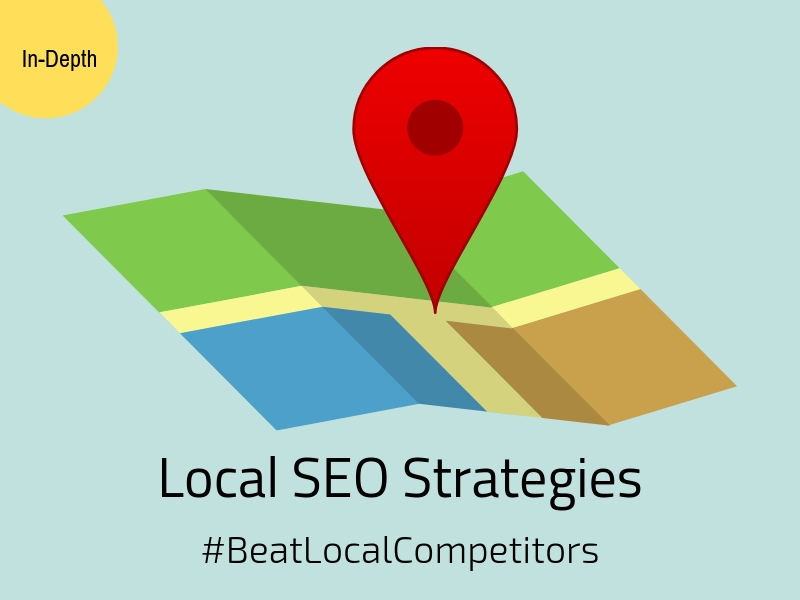
Four out of five consumers use local searches to find local information, which means if your business isn’t optimized for local SEO, you could be missing out on 80% of your potential customers.
So how do you go about this? Well, in this article, I have gathered 17 in-depth local SEO tips and a guide to improve your local SEO rankings and outrank your local competitors, no matter what type of business you do.
So if you’re a small business looking to generate money from your products or services, this article is for you.
To fully understand SEO, check out my full SEO guide for beginners here.
- What Is Local SEO?
- Why Local SEO Matters?
- Top 3 Local SEO Ranking Factors 2020
- 1. Set Up Google My Business (Local Packs)
- 2. Create Local Listings
- 3. Maintain Consistent NAP (Name, Address and Phone Number)
- 4. Get Reviews
- 5. Optimize Website Content For Local Keywords
- 6. Amplify Local Signals On Your Site
- 7. Create Local Pages
- 8. Start A Blog
- 9. Optimize Title Tag, Meta Description For CTR
- 10. Improve Website Loading Speed
- 11. Make Sure Your Site Is Mobile-Optimized
- 12. Use Schema Structured Markup
- 13. Get Some Local Backlinks Juice
- 14. Implement Social Shares
- 15. Get Your Site SSL Certificate
- 16. Get On Local Forums Or Q&A Platform
- 17. Get Featured On Local Press And Media
- Conclusion
What Is Local SEO?
Local SEO is defined as SEO (Search Engine Optimization) done on your website to increase the online visibility of your local business on search engine results, with the ultimate aim of driving organic traffic and improve conversion rate.
Why Local SEO Matters?
Local SEO matters because:
- It helps you generate leads from search engines, the place where people are actually looking to spend money (Quality Leads)
- It helps build an online reputation, brand credibility, and trust
- It requires just a one-time investment. Once your business is ranking, you don’t have to really spend much on it. It helps in generating “free” traffic.
Top 3 Local SEO Ranking Factors 2020
The 3 main local search ranking factors are:
- Google My Business (Proximity, categories, keyword in business title, etc. )
- Links signals (Inbound anchor text, linking domain authority, linking domain quantity, etc. )
- Reviews (Review quantity, review velocity, review diversity, etc. )
Here are the 17 local SEO tips and strategies for 2020:
1. Set Up Google My Business (Local Packs)
Google My Business (GMB) is a free tool for local businesses and organizations to manage their online presence across Google, including Search and Google Maps.
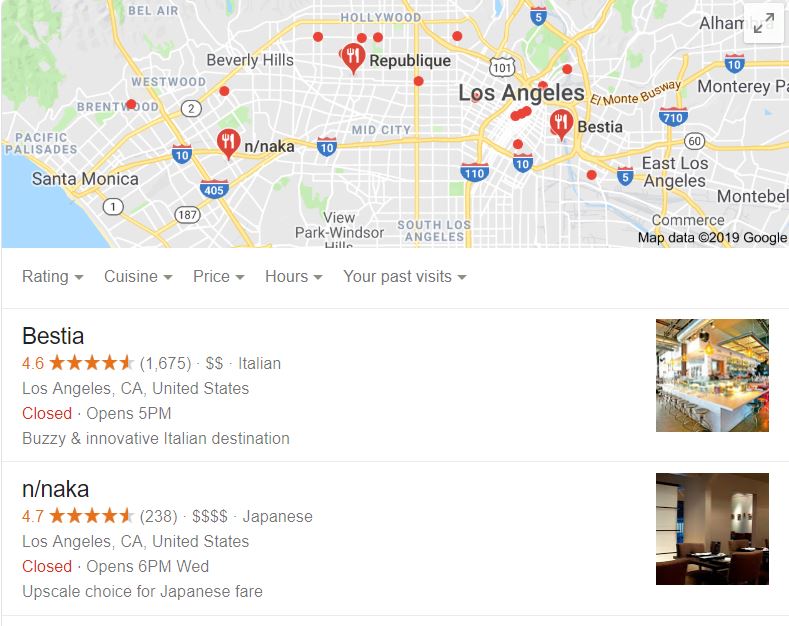
The above image is how GMB would display the search result above other results in the form of snippet listing related to location.
For example, “Restaurant in Los Angeles” or “Plumber near me”. This involves the name of your business + location or location detected by Google.
How To Sign Up/Claim Your Business For Google My Business
- Visit https://www.google.com/business/ and click “Start Now”.
- Select or create the Google account you want to use and sign in.
- Search for your business in the prompted area by name and address.
- Once you have found or created your correct business location and type, click on it.
- Google will need you to verify your business so click on “Mail me my Code”. Your code will be sent to your business location. This usually takes around 2 weeks.
To optimize Google My Business, ensure that you:
- Fill in necessary details like business description, working hours, street’s name, business category, website link, etc.
- Consistently post any updates or news related to your business. GMB has this option in the Google posts section on the GMB dashboard.
- Add quick reservation URLs and Q and A feature to enhance your local pack listing.
- Upload high-quality images of your business as well
Make it as useful to your customers as possible.
2. Create Local Listings
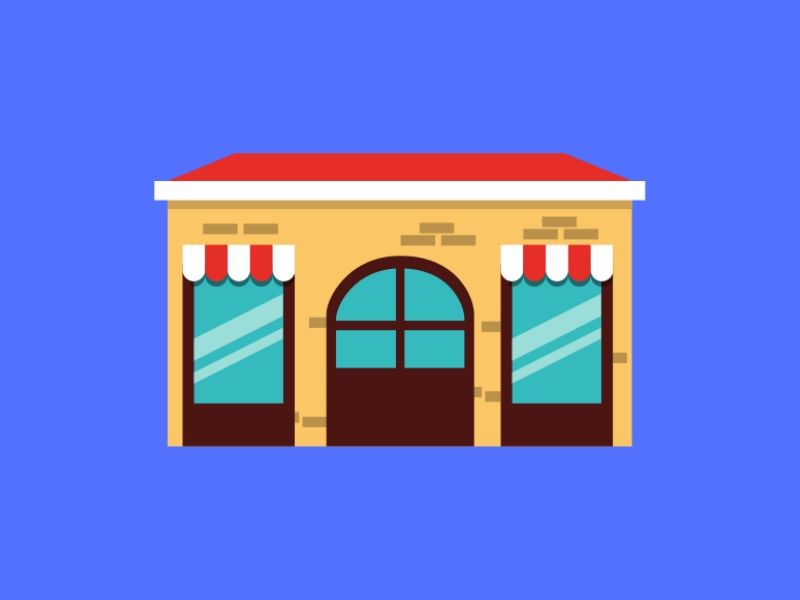
Creating local listings is one of the most local SEO tips. It’s like signaling to Google that your business is well-reputed and is trustworthy.
It is highly recommended to go for other local listing websites for getting more citations for your business. Yelp, Citysearch, Manta, Yellow Pages, etc. are some of the good website directories.
Don’t forget to have positive reviews and your business information as well. Google needs them 🙂
3. Maintain Consistent NAP (Name, Address and Phone Number)
After you have created a Google My Business Listing and local citations, next up in the local SEO strategies is to make sure you have maintained consistent information about your business throughout these listings.
So how do you go about this? Well, very simple here. Maintain the same information on every local listing, your site and each and every place where your local site is mentioned – make them all the same as your GMB listing
Having a consistent NAP ensures that your business is trustworthy and credible enough in Google’s eye. In fact, you need to be careful here.
Since Google is just a mere machine, you need the information to be 100% exactly matched. For instance, if your business’s name in GMB listing ends with “LTD”, then you should not forget to mention this as well in every mention.
Use the Moz Local to check your NAP consistency across important citations.
4. Get Reviews
Next, up in local SEO tips is to improve local search visibility is to encourage people to leave online reviews on your listings.
According to Moz, customer reviews are one of the important ranking factors for local SEO. Besides, over 88% of consumers trust a business with real legit reviews.
One of the best ways to get reviews is to politely ask your customers after the service or once they received the products.
You might want to give something valuable away for free in exchange for a genuine review.
Respond to each and every one of them, even if it might be negative. This shows that you’re actually caring for them and that you would improve next time.
5. Optimize Website Content For Local Keywords
Now that you have an external factor setup, next is to focus on your local content.
This is going to make an impact on your local search rankings when your website is searched locally.
Local keywords are keywords related to your locality. There are 2 types of it, i.e. “Near Me” keywords and generic location keywords.
“Near Me” keywords are everything that starts with your type of business + “Near Me”.
For example: “Plumber Near Me”
Generic location keywords are keywords that have the location name associated with your type of business.
For example: “Plumber in Los Angeles”
To optimize for the “Near Me” keywords, I will discuss it after this point.
Below is how to research the generic location keywords.
Basic Steps For Keywords Research
- Identify sub-topics related to your business. For example, if you run a restaurant business, your subtopics would be something related to types of cuisine.
- Make a list of keywords related to your business. Come up about 50-150 at least. Use tools like Ubersuggest and Google related search to generate keywords and related keywords ideas.
- After that, you should filter out the useless keywords and focus only on keywords which have high search volume, low search difficulty and high cost per click (CPC)
Once you have a list of qualified keywords, next is to create content around each keyword. The trick here is to focus on one keyword per page/article.
6. Amplify Local Signals On Your Site

This local SEO tip is not quite discussed and it’s one of the secrets to improve your local ranking and visibility.
Besides leveraging GMB, local listings and optimizing for local content, you would want to amplify the local signals on your site, to really convince Google about the site’s location.
This is also how you optimize for “Near Me” keywords. This type of keywords is served based only on the location of searchers.
For example, If I live in LA, and I search “Plumber near me”, I will get only the list of sites located in LA, not somewhere else.
5 Tips To Amplify Local Search Signals
- Have the exact match (same as GMB) information of business name, address, working hours, contact details on each and every page of your site – you can utilize the footer area.
- Embed your business location’s Google map location on the homepage and wherever it makes sense.
- Try mention about your full business location on every page
- Link out any local sites where you are mentioned – For example, your chamber of commerce profile.
- Link out to your location’s external page – For example, you link out to Wikipedia’s Los Angeles article.
And that’s all there is it. From now onwards, Google should be able to recognize your site’s location much better.
7. Create Local Pages
If you have the multi-location businesses operate in different areas locally, you would want to create different location-specific pages, targeting those locations in your content marketing strategies.
Use the main keywords (your business keywords) + Locations
For example, if you’re business based in Edmonton, Canada, and you operate in other nearby areas like Leduc and Sherwood Park, Besides your Edmonton page, you would create similar pages for these 2 locations as well.
Remember! Don’t copy-paste the exact description on each and every location on your site as this may lead to duplicate content, which Google doesn’t like.
Make sure each local page is different. keep them similar, but not exactly the same.
8. Start A Blog
A blog is a great way to demonstrate your expertise in the field, provide users knowledge and information, drive traffic, and most importantly, convince Google that your business is trustworthy.
Having a blog on your site is one of the most effective strategies to add to your local search content marketing.
When writing a blog post, make sure you focus on providing values. For example, provide how-to knowledge, let your users know about your business achievements, local news, etc.
Small tip: Internal link your homepage, with the main focused keyword from each of your blogs, to further strengthen the SEO signal.
Internal links are one of the best ways to help flow the domain authority of your site, thus making the overall site rank higher on Google.
9. Optimize Title Tag, Meta Description For CTR
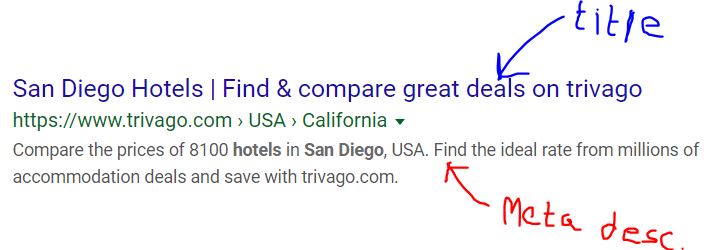
Next tips for local SEO is to optimize your page titles and meta descriptions.
A title tag is an HTML tag that gets displayed on the search engine results.
A meta tag or meta description is what gets displayed below the title tag. It essentially gives users an idea of what your page is about.
Make sure you include your target keywords in both the places and modifiers which makes it interesting.
Ranking high on Google is useless if no one actually clicks through to your search result.
For example, use strong adjectives like “best”, “cheap”, “awesome”, etc. to enhance the CTR.
10. Improve Website Loading Speed

This is one of those local SEO tips that are often neglected
Don’t forget that search engines’ intent is to deliver the best results possible to users
Suppose a person encounters a slow, laggy website, they are going to close the browser before they even read the first sentence right?
According to an article by Unbounce, 46% of people say waiting for pages to load is what they dislike most about browsing the web on mobile.
To test for your site’s speed, use tools like PingDom.com. It’s my favorite one.
To know the loading time of your site, check out the loading time in different areas and find out the average.
11. Make Sure Your Site Is Mobile-Optimized

Who does not use a mobile device these days? People adapt as so Google.
Google clearly mentioned in their article that they will give preferences to websites that are optimized for mobile devices.
So definitely this local SEO tip is for every business out there.
The term “Mobile Optimized” does not mean it should be able to support just mobile but also it should be able to adjust/resize to different devices’ width – whether it’s a different sized tablet screen, smart TV, etc.
In website design, we call it a “responsive website”.
So how do you know whether your site is responsive or not? – Use this free tool by Google.
12. Use Schema Structured Markup
Now I don’t want to get into some fancy technical but to simply explain this, schema markup or structured data was founded at Schema.org, which is a form of microdata.
Once added to a webpage, schema markup creates an enhanced description (commonly known as a rich snippet), which appears in search engine results.
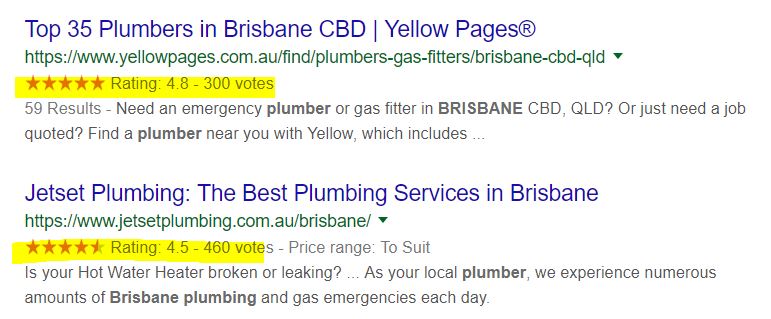
The yellow highlighted portions are what a schema structure would do. It displays small snippets on search results, which can make your site stand out.
Types of schema
- Businesses and organizations
- Events
- People
- Products
- Recipes
- Reviews
- Videos
To implement structured data, check out this Google Structured Data Markup Helper document.
13. Get Some Local Backlinks Juice
As you have probably known that backlinks are one of the main ranking factors for SEO.
Building backlinks to your local website will help you skyrocket your ranking and one of the most important local SEO tips.
How To Acquire Local Links?
There are a number of ways you can acquire links for your website.
This may include using PBN (private blog network), buying links, etc, which are all that we called black hat SEO.
Since it’s called a black hat, I guess you already know it, Google doesn’t at all like that.
To succeed in with SEO in the long term you need to go for white hat SEO, and some of the ways are highlighted below:
- Have your website listed on local directories
- Create valuable contents that people would like to link to
- Do some reach out and ask for links
- Get on the podcast and they will link out to you
- Do some collaborates with related business owners
- Collaborate with other local owners
Besides the steps listed, you can also consider purchasing a white hat link building package from local SEO agencies such as guest posts, blogger outreach, etc.
14. Implement Social Shares

Everyone is on social media! By implementing social shares and connecting your site to social networks, this can make you rank higher in SERP’s.
Although links from social media are not counted for SEO, it can, however, help to signal to Google that people are interested in your business.
The more shares, comments, and people talk about your business on social media, the more importance you site will be to Google’s eyes.
The best platform to focus on is Facebook. This is because Google likes indexing Facebook pages.
15. Get Your Site SSL Certificate
SSL certificate ( things which make your site appear “https” in the URL) is what I commonly see many local business owners neglect.
This is because it usually does not come along with domain and hosting package and has to be purchased separately.
In the past, the cost of it used to be high. But nowadays, it has become part of the standard website and many hosting companies started including for free in their plan or sell it at a very cheap price.
If you are using Cloudflare CDN, you get universal SSL ( which is also applicable) for free.
16. Get On Local Forums Or Q&A Platform
This is another way of helping you gain a reputation in an online world. By being on online communities like forums,
you not only increase traffics to your site by citing your site’s address but also open doors to meet like-minded business owners who could be your collaborators both online and offline.
My largest source of traffic outside Google is Quora. I do not only earn traffic from there but also have helped a countless number of people solve their problems.
This way, it really motivates me and I do time to time get helped by people there as well. So no doubt this opens a way for new portals for my business.
So do not be shy. Get on these platforms and start connecting!
17. Get Featured On Local Press And Media
Featuring on local press and media helps you leverage brand awareness and business credibility.
Google looks at local promotion as a sign of real business. Besides, getting words around locally in your area helps you create a strong online presence.
In SEO, we called this a press release. It’s worth a while to spend money on media to build the authority needed to strive with local SEO.
Conclusion
And that’s all for the complete local SEO tips and tricks in 2020 to improve your website’s local search rankings.
You cannot imagine how organic search can help your business in the long run, better than any type of ads.
So do not quit too soon. Be patient and results will surely show up if you put in consistent work.
Further reading:
- Voice Search SEO Optimization – How to optimize your website for voice search
- Roofing SEO – A complete roofing SEO guide for roofing companies
- Restaurant SEO – A complete restaurant SEO guide for the local restaurants
Feel free to check out my digital marketing page for related services.
So let me know the results after you have applied the tips and tricks listed above in the comment section below.


![CTR Manipulation: 2 SEO Case Studies [Results In 2 Weeks]](https://techjackie.com/wp-content/uploads/2022/03/ctr-manipulation-case-study.jpg)
![How To Use Google Disavow Tool [Case Study + Guide]](https://techjackie.com/wp-content/uploads/2020/07/How-To-Use-Google-Disavow-Tool-Case-Study-Guide.jpg)
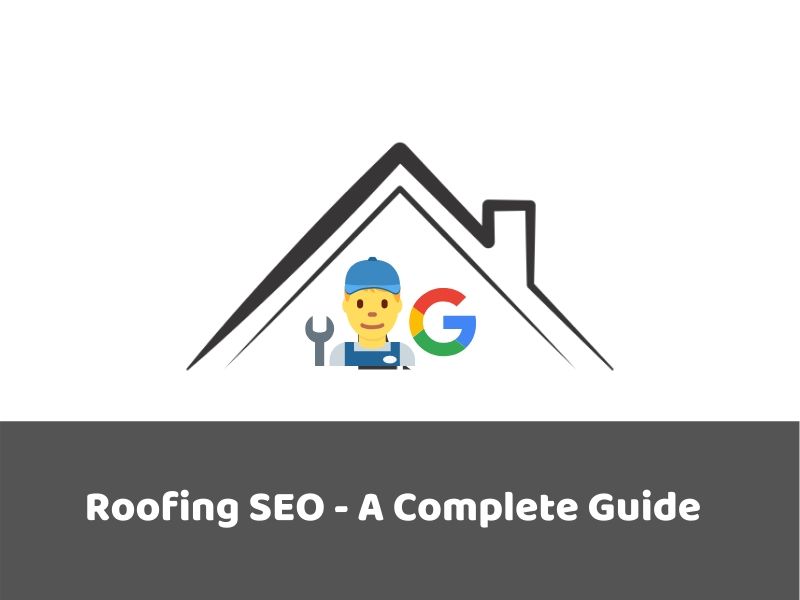

![The Ultimate SEO Guide For Beginners [2019 & Beyond]](https://techjackie.com/wp-content/uploads/2019/07/SEO-guide-for-beginners.jpg)
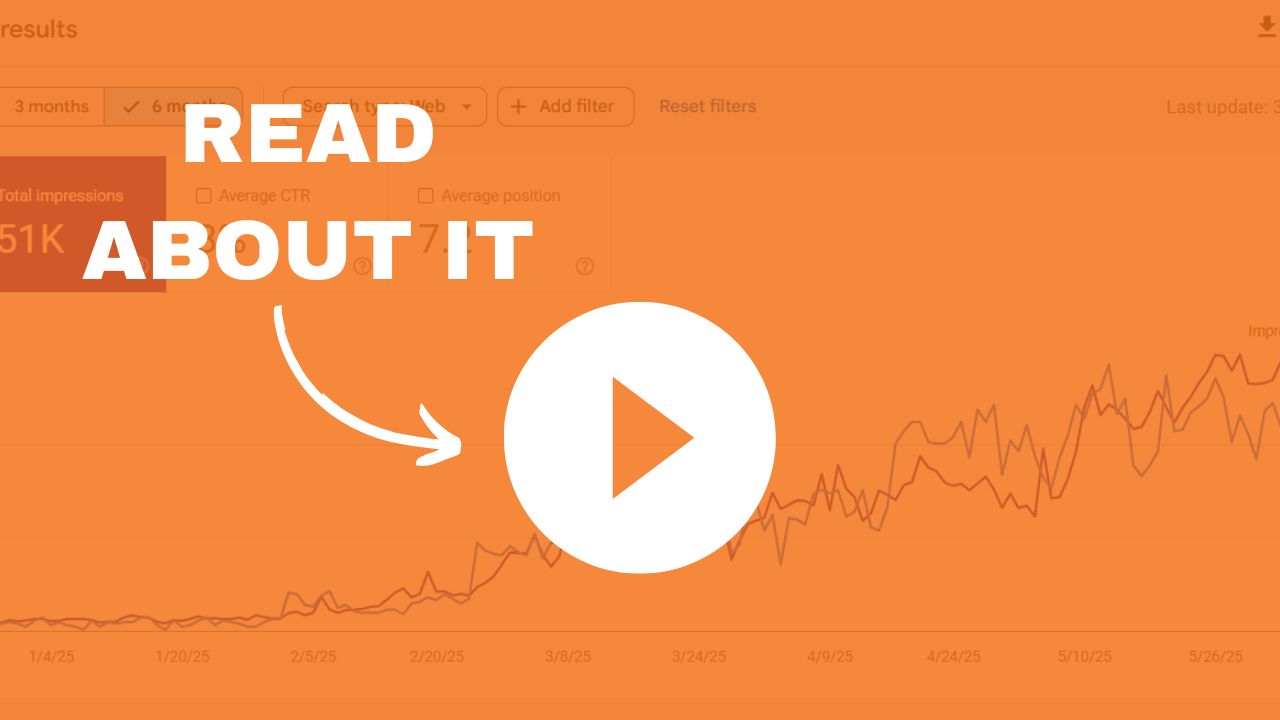
Thanks, Jackie!!
In my opinion, there are four main steps to achieve good results:
1. Register and verify your Google My Business account, don’t forget to verify your account. Usually Google will send a postcard to your physical address containing a PIN code.
2. Fill up your information on the Google My Business listing as complete as you can, including using and optimizing photos
3. Build up local citations on review sites and local directories according to your industry. A simple Google search will help you find these directories. Make sure your information between listings are always consistent, especially your Name, Address, and Phone (NAP).
4. Encourage your existing customers to leave positive reviews especially on your Google Map listing, but also on other review sites. Offer incentives if necessary, like giving discounts, freebies, and so on.
Exactly Mike! According to me, for local SEO, the most important thing is Google My Business. From my experience, if your website which is linked with GMB is SEO optimized (especially have great quality backlinks) the site will rank well on GMB as well, though reviews also do play a bit role.